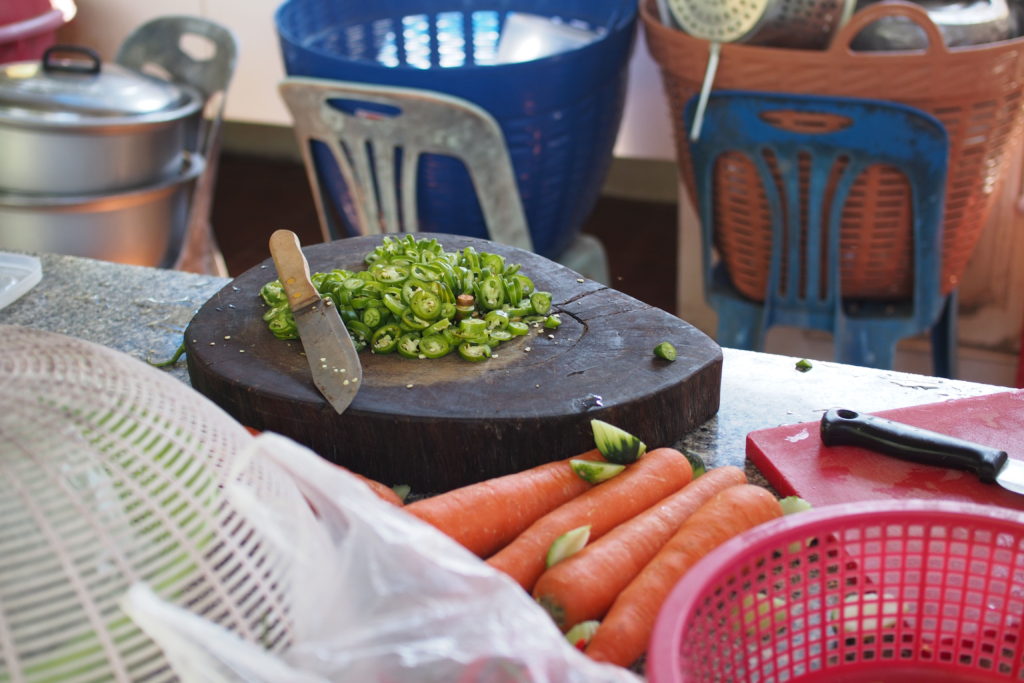Once upon a time (I am told that if one begins a story with these words it becomes an instant success. I will test this hypothesis here) a young Bhatia family came to the U.S. in search of greener pastures. The time goes so far back that there were neither Indian restaurants nor any Indian grocery stores anywhere within 50 miles of where they lived. So, if they ever wanted to eat any Indian delicacies like samosas, Batata Vadas or pakoras, they had to be made at home by the people themselves.
On a particular Sunday, it was drizzling and the weather had turned just a bit cold. Our young family was reminded of their days in Bombay when they would have samosas, pakoras and hot masala chai on such days. As the image of this scenario grew stronger in their minds, the juices began to flow in their mouths and stomachs and, suddenly, they were all hungry for the same. The only option of course, was to start making them themselves.
It was midmorning by this time when husband and wife entered the kitchen. Since samosas were their favorite, they settled on them. So maida was kneaded into dough and potatoes were boiled, mashed and spices added to them to make the filling. Soon the kitchen was filled with the aroma of hot, fried samosas. And it was not long before a good batch of samosas were done – ready to be consumed and enjoyed after all the work that had gone into it.
But there was a problem. A bit of the mixture of potatoes was left over. Now, everyone knows that one cannot leave potatoes – they begin to taste bad after just a few hours. After some thought, a brilliant idea emerged – why not mix some besan and make Batata Vadas with the remaining potato mixture?
On a particular Sunday, it was drizzling and the weather had turned just a bit cold. Our young family was reminded of their days in Bombay when they would have samosas, pakoras and hot masala chai on such days.
So the besan was mixed and all the spices added. Frying of Batata Vadas began and the kitchen was once again filled with the aroma of frying, this time, Batata Vadas. Both husband and wife went about doing these things enthusiastically, knowing that a good meal awaited them as soon as the cooking was done. And soon, a good batch of Batata Vadas were done – ready to be consumed and enjoyed for all the work that had gone into it.
There was still a problem though. A lot of besan was left over. Now everyone knows that one cannot leave besan out for long. It dries out and the pot becomes difficult to clean. After some thought a second brilliant idea emerged – why not cut some onions and make pakoras with the remaining besan?
So off they went- cutting onions, mixing in spices, wrapping them in besan and deep frying them to make pakoras. Soon, the kitchen was filled with the aroma of hot pakoras and they just could not wait until all the frying was done so that they could enjoy the mouth-watering meal of samosa, Batata Vadas, pakoras and hot masala chai.
At long last, the frying of pakoras was done. There was only one problem though. Some of the sliced onions were left over. Now everyone knows that one cannot leave cut onions out for long. They lose water, go bad and the whole house begins to smell.
They both looked at each other. No words were spoken, like they both knew what the other wanted. They were both tired of standing and working in the kitchen for so long. Their nostrils were saturated with the aroma of frying oil.
They both looked at each other. No words were spoken, like they both knew what the other wanted. They were both tired of standing and working in the kitchen for so long. Their nostrils were saturated with the aroma of frying oil. Their hunger had evaporated – they could hardly contemplate eating any of the stuff they had made. They simply threw the remaining onions in trash can, slumped on the sofa, turned on the TV; and surrendered to the channel that happened to be on. Samosas, Batata Vadas, pakoras and hot Masala Chai. would have to wait for another time.
